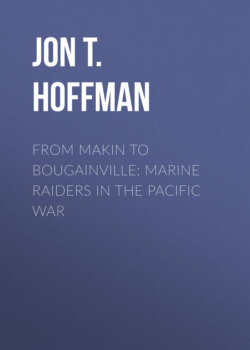Читать книгу From Makin to Bougainville: Marine Raiders in the Pacific War - Jon T. Hoffman - Страница 7
На сайте Литреса книга снята с продажи.
Оглавление[Sidebar (page 3):]
Brigadier General Evans F. Carlson, USMC
Table of Contents
Evans F. Carlson got an early start in his career as a maverick. He ran away from his home in Vermont at the age of 14 and two years later bluffed his way past the recruiters to enlist in the Army. When war broke out in 1917, he already had five years of service under his belt. Like Merritt A. Edson, he soon won a commission, but arrived at the front too late to see combat. After the war he tried to make it as a salesman, but gave that up in 1922 and enlisted in the Marine Corps. In a few months he earned a commission again. Other than a failed attempt at flight school, his first several years as a Marine lieutenant were unremarkable.
In 1927 Carlson deployed to Shanghai with the 4th Marines. There he became regimental intelligence officer and developed a deep interest in China that would shape the remainder of his days. Three years later, commanding an outpost of the Guardia National in Nicaragua, he had his first brush with guerrilla warfare. That became the second guiding star of his career. In his only battle, he successfully engaged and dispersed an enemy unit in a daring night attack. There followed a tour with the Legation Guard in Peking, and a stint as executive officer of the presidential guard detachment at Warm Springs, Georgia. In the latter job Carlson came to know Franklin D. Roosevelt.
Captain Carlson arrived in Shanghai for his third China tour in July 1937. Again like Edson, he watched the Japanese seize control of the city. Detailed to duty as an observer, Carlson sought and received permission to accompany the Chinese Communist Party’s 8th Route Army, which was fighting against the Japanese. For the next year he divided his time between the front lines and the temporary Chinese capital of Hangkow. During that time he developed his ideas on guerrilla warfare and ethical indoctrination. When a senior naval officer censured him for granting newspaper interviews, Carlson returned to the States and resigned so that he could speak out about the situation in China. He believed passionately that the United States should do more to help the Chinese in their war with Japan.
During the next two years Carlson spoke and wrote on the subject, to include two books (The Chinese Army and Twin Stars of China), and made another trip to China. With war looming for the United States, he sought to rejoin the Corps in April 1941. The Commandant granted his request, made him a major in the reserves, and promptly brought him onto active duty. Ten months later he created the 2d Raider Battalion.
After his departure from the raiders in 1943, Carlson served as operations officer of the 4th Marine Division. He made the Tarawa landing as an observer and participated with his division in the assaults on Kwajalein and Saipan. In the latter battle he received severe wounds in the arm and leg while trying to pull his wounded radio operator out of the line of fire of an enemy machine gun. After the war Carlson retired from the Marine Corps and made a brief run in the 1946 California Senate race before a heart attack forced him out of the campaign. He died in May 1947.
